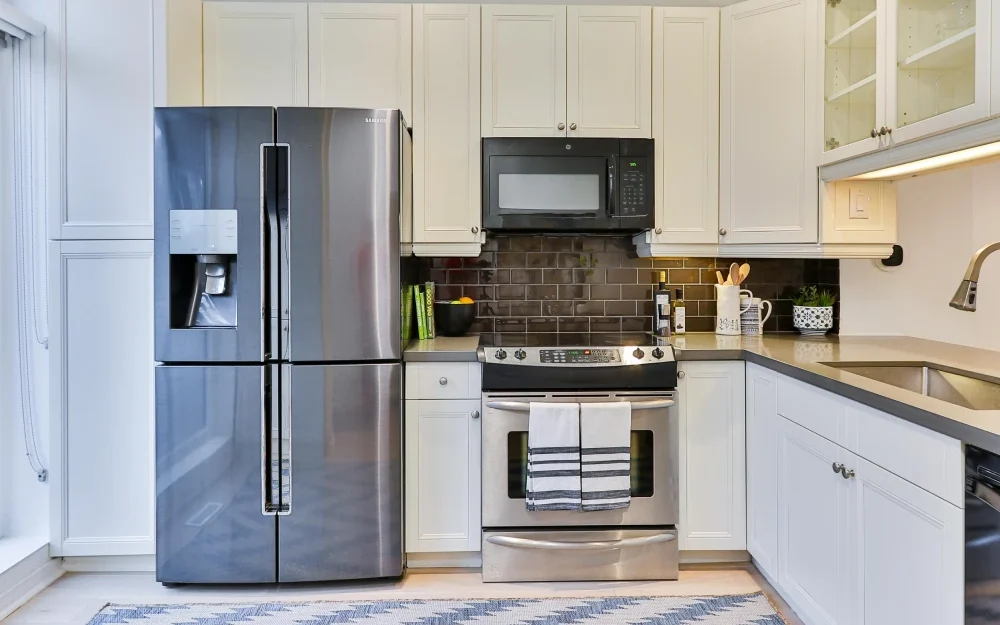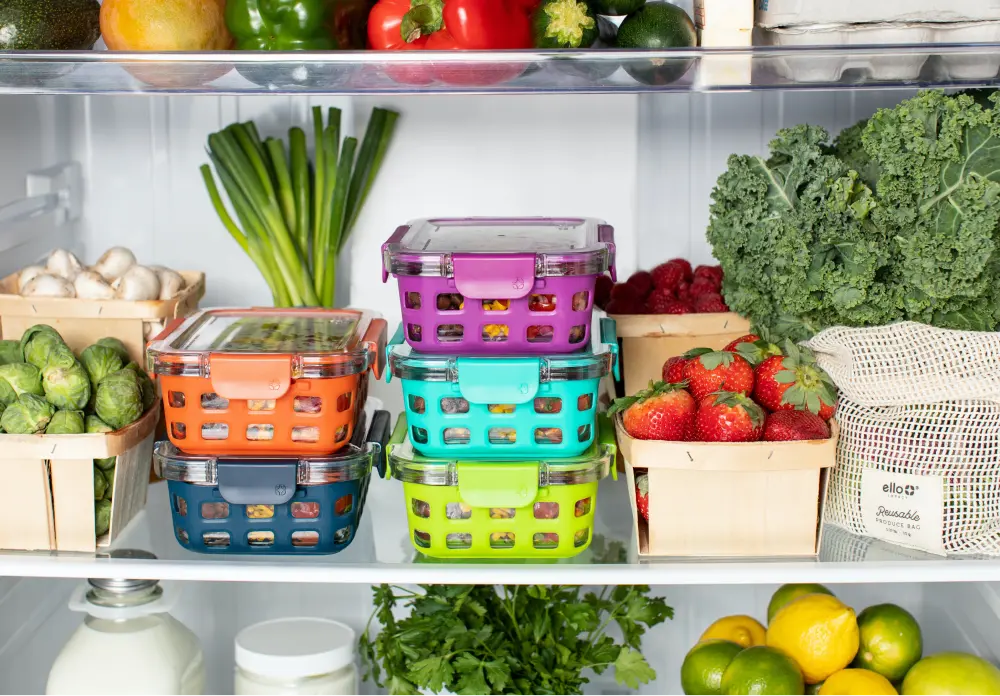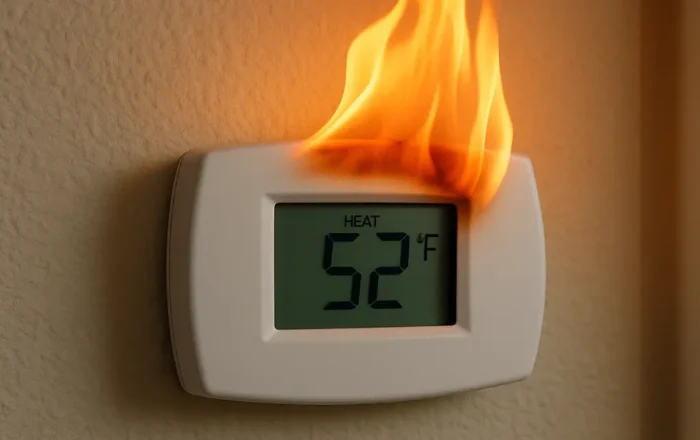Is My Thermostat Broken?
5 minute readHow to diagnose a faulty thermostat, fix common issues, and know when it’s time for a replacement.
Home > Blog > How Much Electricity Does a Refrigerator Use?
6 minute read • Last update August 2024

Refrigerators use between 300-800 kWh of electricity per year, about 1-2 kWh per day. Refrigerator operation can cost between $100-$150 per year.
The amount of energy consumed by a refrigerator will depend on the size of the fridge (cubic square feet), the age of the appliance, the type of fridge (door configuration), and the location of your home.
Refrigerators that are smaller, younger, have fewer doors that are opened less often, and reside in colder climates will use the least amount of electricity. Conversely, very large, old refrigerators that are opened regularly in very hot regions of the world will use much more electricity. New refrigerators are also typically much more energy efficient due to enhanced technology.
Did you know that your refrigerator is one of the most energy-consuming appliances in your home? They are larger than most appliances and are always running. You can discover how much energy a refrigerator is estimated to use annually by checking the Energy Guide label on the back or the side of the appliance.
Knowing how much energy your fridge consumes and the factors that affect its consumption can help you manage and reduce your energy usage, resulting in lower electricity costs and a smaller carbon footprint. It can also help inform your next refrigerator purchase decision.
Refrigerator energy consumption depends on various factors, such as:

The Energy Guide label, found on all appliances sold at retail stores, provides an estimate of the refrigerator’s annual electricity consumption in kilowatt-hours (kWh) and its estimated yearly operating cost based on the national average electricity rate.
Use the details on the Energy Guide label to calculate your refrigerator’s daily and hourly energy consumption, which can help enhance your understanding and management of your appliance’s energy usage.
If a refrigerator is estimated to use 300 kWh per year, you can expect it to use about 25 kWh per month, and about 0.8 kWh per day.
A refrigerator with an annual estimated usage of 800 kWh per would use about 67 kWh per month, and 2.2 kWh per day.
The average refrigerator can use about $100 worth of electricity per year depending on your fridge model, your TDU region, and the energy efficiency of the appliance.
The cost of running a refrigerator can be a significant portion of your monthly electricity bill. You can calculate the energy cost of your refrigerator with the annual kWh usage of the appliance and the energy charge and utility pass through charges from your energy plan’s Electricity Facts Label.
Learn how to calculate your electricity bill.
Here’s the formula:
Electricity Cost = Annual kWh Usage x (Energy Charge + TDU Delivery Charge)
If your refrigerator consumes 500 kWh of electricity annually and you live in Dallas (the Oncor TDU region) with an electricity plan that has an Energy Charge of $0.14 cents per kWh, your annual spending on energy for your fridge would be about $95.
Here’s how the math works out:
500 kWh x ($0.14 + $0.050339) = $95.17
A refrigerator that uses 800 kWh annually, would cost about $150 per year to operate given the same Energy Charge and TDU region.
How does your energy bill stack up to the average in Texas?

Energy efficiency is paramount in managing your refrigerator’s energy consumption, with the ENERGY STAR certification being a vital element to ponder when selecting an energy-efficient appliance. Understanding the advantages of an energy-efficient refrigerator and the significance of the ENERGY STAR certification allows you to make informed decisions about your appliance purchases, contributing to a more sustainable future.
ENERGY STAR is a government-backed program that helps consumers identify energy-efficient products. Products with the ENERGY STAR certification have met strict energy efficiency criteria and use at least 20% less energy than the minimum federal standards.
By choosing energy star appliances, you can save money on your electricity bill and contribute to a cleaner environment.
The benefits of energy efficient refrigerators include:
Mini fridges, although smaller than their full-sized counterparts, still consume electricity and contribute to your overall energy consumption.
An average mini-fridge uses 90 watts of electricity, which, considering the size of the appliance, can be quite significant. In the United States, mini-fridge owners spend around $37 per year on electricity to power their appliances.
Understanding your mini fridge’s energy consumption enables you to make informed decisions about its usage and the potential for energy savings.
To improve the energy efficiency of your mini fridge, consider proper placement away from heat sources, regular maintenance such as cleaning coils and checking door seals, and keeping the door closed as much as possible.
Implementing these tips can help your mini fridge operate at peak efficiency, thereby reducing its energy consumption and your electricity bill.
Reducing your refrigerator’s power consumption can lead to significant energy savings and a smaller environmental footprint. By following maintenance tips and adopting habits for energy savings, you can ensure that your refrigerator operates at peak efficiency, lowering its energy consumption and your electricity costs.
Regular maintenance can help decrease your refrigerators energy consumption, including:
Proper maintenance not only helps reduce energy consumption but also extends the life of your appliance, ensuring that it operates at peak efficiency for years to come.
Adopting habits such as keeping the refrigerator door closed as much as possible, organizing the interior for easy access, and defrosting regularly can lead to significant energy savings.
Adopting these habits can help you run a refrigerator more efficiently, thus lowering its energy consumption and your electricity costs.

In conclusion, understanding your refrigerator’s energy consumption and implementing energy-saving tips and habits can lead to significant savings on your electricity bill and contribute to a greener future. By upgrading to energy-efficient appliances, performing regular maintenance, and even considering solar panels as an alternative power source, you can take control of your refrigerator’s energy usage and make a positive impact on the environment.
On average, a fridge will use between 1 to 2 kilowatts per hour each day, equating to approximately $80-$150 per year, depending on the size of the fridge and its energy efficiency.
Running a refrigerator typically costs around $6-$15 per month.
Heating and cooling appliances are the biggest electricity consumers in the average home, accounting for up to 50% of total usage. Water heaters, lighting, refrigerators, washers and dryers, electric ovens, dishwashers, and TVs all contribute to electricity consumption as well.
Upgrading to an ENERGY STAR-certified refrigerator can provide substantial benefits such as reduced electricity bills and a smaller environmental footprint, all while consuming less energy.
Graham Lumley, Digital Marketing Manager at BKV Energy, leads digital and traditional marketing strategies, focusing on educating Texans about the state's deregulated energy market. With over 8 years of marketing experience, he creates content to help consumers understand and save on their energy bills, bringing a fresh and dynamic approach to the industry.

How to diagnose a faulty thermostat, fix common issues, and know when it’s time for a replacement.

Ceiling fans use less electricity than air conditioners, offering an efficient, low-cost way to stay cool year-round in Texas
Get $50 off your electric bill!
Use code BKVEJOINUS50
Enter your zip code to shop BKV Energy's affordable, fixed-rate Texas electricity plans. Use the promo code for $50 off your electric bill.